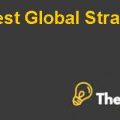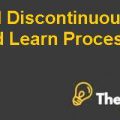
Arguments for Centralization at Nestle
Environment Forces
Amongst market forces, mergers and acquisition are the most common tool that have been applied by Nestle since its inception. The company has a long history of acquiring new companies when it enters a new market. Therefore, this particular strategy requires steps from the Center in order to centralize its process.
Internal Forces
It is in the power of the company to introduce new product concepts through a complex chain of command model which highlights a top-down approach. The company can introduce new product concepts without consulting the lower management. However, certain small changes can be made regarding the local taste of end consumers. The goals of each country organization is set by the Center which reveals the centralized approach from the company.
Is Nestle decentralized as it appears?
Nestle S.A acknowledges autonomy is necessary against their profit responsibility within a country. The Center admires that the taste and preferences, changes across national boundaries, therefore the decision making power shall be authorized to the local country managers. However, the main role of the Center is to infuse certain policies, divide goals to the regional managers for their respective zones, maintain the standards, worldwide, and to adopt a ‘uniquely Swiss and neutral philosophy’. In this particular concept, the Center is responsible to provide most of the product concepts and suggest names of the brands while maintaining high quality standards. Many examples could be found related to the Center, which has authorized the country managers to make their decisions. Nestle approves the decentralized approach utilized in its company and favors the particular system, but the chain of command for Nestle is more inclined towards a top-down management approach instead of bottom-up approach where information flows from the lower to the top management.
How does the center exert influence?
Mostly, the Center exerts its influence through a new product idea or through the standardization policies adopted by the company. In the case of implementing a new product idea, the company focuses on launching the product without a thorough research as happened in the case of 5 minutes Maggi noodles. The packaging and the pricing created problems for the Center because the limited research was conducted. For the standardized policies, the Center focuses on persuading the country managers and the product directors in implementing their policies. However, many examples can be reflected in which country managers have refused to adopt standardized policies in their country due to different tastes and preferences.
Evaluation of Product Director’s Role
Since the beginning of 1974, the role of Product Director has become advanced as they were appointed in the headquarter from their respective local markets. A Product Director is assigned to a particular brand or for a particular product line and has to develop global and regional marketing strategies for their respective brands. A Product Director is responsible for developing a positioning strategy, packaging, and the guidelines for advertisements for their brands. However, these guidelines were approved by the center and then transmitted to the local markets for further evaluation and constructive conflicts. A Product Director has close interaction with the Research and Development Department (RECO) for the new product ideas or the changes in the existing products. A Product Director would evaluate the perspectives of the ideas presented by RECO and then the idea is transferred to the country organization for implementation.
Product Directors also have to influence and convince the country organizations for investments in new product ideas once the new product idea gets approved through all legal channels and chain of commands. Transferring of knowledge from one country organization to another is also a major task assigned to the Product Directors as they can conduct seminars and distribute case studies that discusses a company’s situation in one country. It is therefore confirmed that the Product Directors have the desired strength to develop major strategies for their brands that could either be successful or could lead to its termination in a market but through proper channels and accountability procedures. As the Product Directors are chosen from their local country organizations, therefore when they are exposed towards the major challenges faced by the Center, they may return to their local markets.
Product Director Securing Cooperation of Country Organization
A Product Director secures the cooperation of country organization because a Product Director suggests a particular strategy for a country and develops a constructive approach in making consensus. A Product Director convinces country organizations to develop certain strategies through reasoning’s and the date provided by RECO. A Product Director has to carefully drive strategies for investments in particular brands and has to consult with the country organization for taking investment risks after a careful briefing of the future perspectives..................................
This is just a sample partial case solution. Please place the order on the website to order your own originally done case solution.













